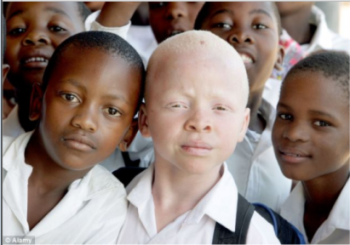Serendip is an independent site partnering with faculty at multiple colleges and universities around the world. Happy exploring!
Genetics

This hands-on, minds-on activity helps students to understand basic principles of genetics, including (1) how genotype influences phenotype via the effects of genes on protein structure and function and (2) how genes are transmitted from parents to offspring through the processes of meiosis and fertilization.
Students use model chromosomes to demonstrate how meiosis and fertilization are summarized in Punnett squares.
In the coin flip activity, students learn about the probabilistic nature of inheritance and Punnett square predictions.

Download Student Handout: PDF format or Word format
Download Teacher Preparation Notes: PDF format or Word format
The Teacher Preparation Notes provide instructional suggestions and background information and explain how this activity is aligned with the Next Generation Science Standards.
We invite comments or a brief description of any problem you might have encountered. If you would prefer to send your comments or questions in a private message, please write Ingrid Waldron at iwaldron@sas.upenn.edu.
Multiple additional genetics activities are available at https://serendipstudio.org/exchange/bioactivities/GeneticsConcepts.











Comments
2020 revision
The biggest change has been that parts of the Genetics Student Handout and the Genetics Supplement have been revised as individual activities:
The revised Genetics Student Handout includes improved versions of the two hands-on activities in the original Genetics Student Handout.
Remote ready individual activities
The new individual activities are all REMOTE READY!
Best wishes to all, and thank you to Dr. Waldron.
Ann
answers to genetic supplement
Are there answers for the genetic supplement? Specifically for comparing the punnet square and pedigree models?
answer key
Please see the Teacher Preparation Notes for information about this comparison (page 15) and how to request a key (page 4).
Ingrid
2019 revision
Many parts of the Genetics and Genetics Supplement Student Handouts have been reworded and reorganized to make it easier for students to understand the concepts and to increase student interest. Multiple parts of the Teacher Preparation Notes have also been revised for improved clarity and emphasis on the most important points.
2018 revision
The Genetics activity has been entirely rewritten to focus on the guiding question, “How do genes contribute to the similarities and differences between parents and their children?” In the Student Handout, we have made major changes to the questions and improved the logical flow to help students understand important concepts and to counteract common misconceptions about genetics. These changes will help students better understand topics such as polygenic inheritance, the role of mutations, and what a Punnett square can and cannot predict.
model chromosomes
Can you tell me an example of what we can use for "model chromosomes" . Just cut something from a drawing?
Model chromosomes
Instructions for making model chromosomes are available in the Teacher Preparation Notes for our mitosis activity (/sci_edu/waldron/#mitosis). There are two versions of the introduction to genetics principles in our genetics activity. One (in the Student Handout) uses model chromosomes and is designed for people who have completed the mitosis and meiosis activities which use the model chromosomes. The other (in the Genetics Supplement) does not use model chromosomes and is designed for people who have not completed the mitosis and meiosis activities.
Ingrid
answer key
Hi
I am wondering if there is an answer key available for the Genetics handouts?
Answer key
Please see the Teacher Preparation Notes for information about an answer key and other useful information.
Ingrid
2017 revision
The revisions of the Student Handout include more emphasis on having students actively construct their understanding of key points, with less explicit explanation. The revisions will also help students better understand random variation and the strengths and limitations of Punnett squares as models of inheritance. The revisions of the Teacher Preparation Notes include more guidance on how to incorporate NGSS Crosscutting Concepts In this activity.
2016 revision
Many of the questions and explanations have been clarified to improve student understanding of important concepts. Also, the Genetics Student Handout is now designed to follow our meiosis and fertilization activity, and an alternative introductory module for teachers who do not want to use the model chromosomes is provided in the Genetics Supplement.
2014 revision
The 2014 revision includes clarification of many of the questions and explanations in the Student Handout, as well as clarification of the instructions and background information in the Teacher Preparation Notes. The introductory module in the Genetics Supplement has been modified to reduce redundancy for teachers who will be using this activity after our Meiosis and Fertilization activity.
2013 revision
The 2013 revision of this genetics activity provides a streamlined Student Handout that engages students in learning all of the basic concepts, together with a Genetics Supplement that includes two extension activities that reinforce the basic concepts and introduce additional genetics concepts and skills. In addition, the introductory explanations in the Student Handout have been clarified, and the questions in the Student Handout and Genetics Supplement have been revised to more closely align with the learning goals and with Next Generation Science Standards.
January, 2011 revision
The Student Handout now includes a more explicit use of model chromosomes or diagrams to ensure that students understand how meiosis and fertilization result in inheritance and provide the basis for understanding Punnett squares. Numerous additional revisions in the Student Handout and Teacher Preparation Notes are designed to improve understanding of the biology of genetics.
July, 2010 revision
In this revision of the Genetics activity we have modified the coin toss activity so students compare the distribution of genotypes in their families of four "children" with the results for the entire class. The larger sample size provided by using the distribution of genotypes for all of the "children" produced by the students in your class will result in less random variation and a closer approximation to the predictions of the Punnett square. We have made additional, more minor improvements in both the Student Handout and the Teacher Preparation Notes.
January, 2010 revision
Post new comment